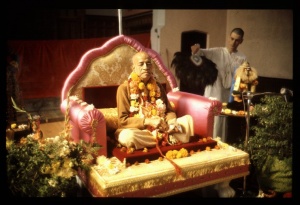SB 8.12.34: Difference between revisions
m (1 revision(s)) |
No edit summary |
||
| Line 1: | Line 1: | ||
{{info | {{info | ||
|speaker= | |speaker=Śukadeva Gosvāmī | ||
|listener=King | |listener=King Parīkṣit | ||
}} | }} | ||
[[Category:Srimad-Bhagavatam - Canto 08 Chapter 12]] | |||
[[Category:Bhagavatam Verses Spoken by Sukadeva Gosvami - Vanisource|081234]] | |||
<div style="float:left">'''[[Srimad-Bhagavatam]] - [[SB 8|Eighth Canto]] - [[SB 8.12: The Mohini-murti Incarnation Bewilders Lord Siva|Chapter 12: The Mohinī-mūrti Incarnation Bewilders Lord Śiva]]'''</div> | |||
<div style="float:right">[[File:Go-previous.png|link=SB 8.12.33]] '''[[SB 8.12.33]] - [[SB 8.12.35]]''' [[File:Go-next.png|link=SB 8.12.35]]</div> | |||
{{RandomImage}} | |||
==== TEXT 34 ==== | ==== TEXT 34 ==== | ||
<div | <div class="verse"> | ||
sarit-saraḥsu śaileṣu | :sarit-saraḥsu śaileṣu | ||
vaneṣūpavaneṣu ca | :vaneṣūpavaneṣu ca | ||
yatra kva cāsann ṛṣayas | :yatra kva cāsann ṛṣayas | ||
tatra sannihito haraḥ | :tatra sannihito haraḥ | ||
</div> | </div> | ||
| Line 17: | Line 22: | ||
==== SYNONYMS ==== | ==== SYNONYMS ==== | ||
<div | <div class="synonyms"> | ||
''sarit''—near the shores of the rivers; ''saraḥsu''—and near the lakes; ''śaileṣu''—near the mountains; ''vaneṣu''—in the forests; ''upavaneṣu''—in the gardens or small forests; ''ca''—also; ''yatra''—wherever; ''kva''—anywhere; ''ca''—also; ''āsan''—were exiting; ''ṛṣayaḥ''—great sages; ''tatra''—there; ''sannihitaḥ''—was present; ''haraḥ''—Lord Śiva. | |||
</div> | </div> | ||
| Line 24: | Line 29: | ||
==== TRANSLATION ==== | ==== TRANSLATION ==== | ||
<div | <div class="translation"> | ||
Following Mohinī, Lord Śiva went everywhere—near the shores of the rivers and lakes, near the mountains, near the forests, near the gardens, and wherever there lived great sages. | Following Mohinī, Lord Śiva went everywhere—near the shores of the rivers and lakes, near the mountains, near the forests, near the gardens, and wherever there lived great sages. | ||
</div> | </div> | ||
| Line 31: | Line 36: | ||
==== PURPORT ==== | ==== PURPORT ==== | ||
<div | <div class="purport"> | ||
Śrīla Viśvanātha Cakravartī Ṭhākura remarks that Mohinī-mūrti dragged Lord Śiva to so many places, especially to where the great sages lived, to instruct the sages that their Lord Śiva had become mad for a beautiful woman. Thus although they were all great sages and saintly persons, they should not think themselves free, but should remain extremely cautious about beautiful women. No one should think himself liberated in the presence of a beautiful woman. The śāstras enjoin: | Śrīla Viśvanātha Cakravartī Ṭhākura remarks that Mohinī-mūrti dragged Lord Śiva to so many places, especially to where the great sages lived, to instruct the sages that their Lord Śiva had become mad for a beautiful woman. Thus although they were all great sages and saintly persons, they should not think themselves free, but should remain extremely cautious about beautiful women. No one should think himself liberated in the presence of a beautiful woman. The ''śāstras'' enjoin: | ||
:mātrā svasrā duhitrā vā | :mātrā svasrā duhitrā vā | ||
| Line 41: | Line 46: | ||
"One should not stay in a solitary place with a woman, even if she be his mother, sister or daughter, for the senses are so uncontrollably powerful that in the presence of a woman one may become agitated, even if he is very learned and advanced." ([[SB 9.19.17]]) | "One should not stay in a solitary place with a woman, even if she be his mother, sister or daughter, for the senses are so uncontrollably powerful that in the presence of a woman one may become agitated, even if he is very learned and advanced." ([[SB 9.19.17]]) | ||
</div> | </div> | ||
__NOTOC__ | |||
<div style="float:right; clear:both;">[[File:Go-previous.png|link=SB 8.12.33]] '''[[SB 8.12.33]] - [[SB 8.12.35]]''' [[File:Go-next.png|link=SB 8.12.35]]</div> | |||
__NOTOC__ | |||
__NOEDITSECTION__ | |||
Revision as of 18:07, 27 June 2021

A.C. Bhaktivedanta Swami Prabhupada
TEXT 34
- sarit-saraḥsu śaileṣu
- vaneṣūpavaneṣu ca
- yatra kva cāsann ṛṣayas
- tatra sannihito haraḥ
SYNONYMS
sarit—near the shores of the rivers; saraḥsu—and near the lakes; śaileṣu—near the mountains; vaneṣu—in the forests; upavaneṣu—in the gardens or small forests; ca—also; yatra—wherever; kva—anywhere; ca—also; āsan—were exiting; ṛṣayaḥ—great sages; tatra—there; sannihitaḥ—was present; haraḥ—Lord Śiva.
TRANSLATION
Following Mohinī, Lord Śiva went everywhere—near the shores of the rivers and lakes, near the mountains, near the forests, near the gardens, and wherever there lived great sages.
PURPORT
Śrīla Viśvanātha Cakravartī Ṭhākura remarks that Mohinī-mūrti dragged Lord Śiva to so many places, especially to where the great sages lived, to instruct the sages that their Lord Śiva had become mad for a beautiful woman. Thus although they were all great sages and saintly persons, they should not think themselves free, but should remain extremely cautious about beautiful women. No one should think himself liberated in the presence of a beautiful woman. The śāstras enjoin:
- mātrā svasrā duhitrā vā
- nāviviktāsano bhavet
- balavān indriya-grāmo
- vidvāṁsam api karṣati
"One should not stay in a solitary place with a woman, even if she be his mother, sister or daughter, for the senses are so uncontrollably powerful that in the presence of a woman one may become agitated, even if he is very learned and advanced." (SB 9.19.17)